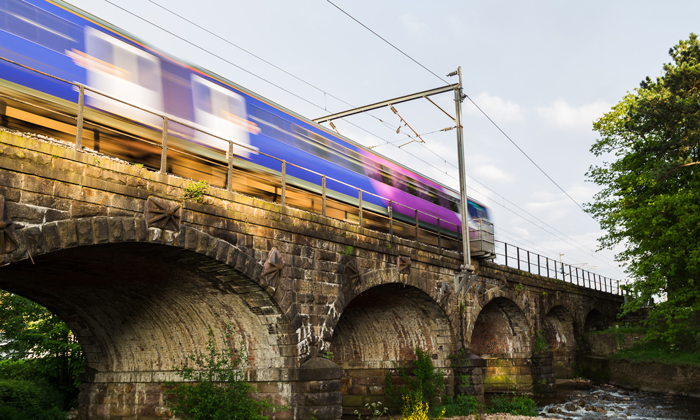£590 million investment announced for Northern UK rail upgrades
Posted: 23 July 2020 | Global Railway Review | No comments yet
The investment will kickstart the development of the Transpennine line between Leeds, Huddersfield and Manchester, improving connectivity across the North.


The UK Transport Secretary, Grant Shapps, has confirmed a £589 million investment from the UK government to kickstart work on the Transpennine main line between Leeds, Huddersfield and Manchester, alongside the establishment of a new Northern Transport Acceleration Council, which will be dedicated to accelerating vital infrastructure projects and better connecting communities across towns and cities in the North of the UK.
The UK Transport Secretary and Northern Powerhouse Minister, Grant Shapps, said: “People across the North rightly expect action, progress and ambition, and this government is determined to accelerate improvements as we invest billions to level up the region’s infrastructure. We are determined to build back better at pace, and this new council will allow us to engage collectively and directly with elected Northern leaders to build the vital projects the region is crying out for.”
Rishi Sunak, the UK’s Chancellor of the Exchequer, said: “This levelling-up opportunity will be key in our recovery from coronavirus – and our long-term success will rely on having world-class infrastructure in all parts of the country. The Transpennine rail upgrade shows we are delivering on our promises to the North.”
The most congested section of the route will be doubled from two to four tracks, allowing fast trains to overtake slower ones, subsequently improving journey times and reliability for passengers across the North.
Most of the line will be electrified, but the ambition is to go further. Full electrification, digital signalling, more multi-tracking and improved freight capacity are now under consideration as part of an “Integrated Rail Plan”, which is due to report in December 2020.
The improvements would: Allow for all-electric services between Liverpool, Manchester, Leeds, York and Newcastle; bring longer and more frequent trains into service; and create significantly more local capacity along the line.
Upgrades to allow more freight on the route, replacing thousands of diesel lorry journeys with electric freight trains, will also be considered in the plan.
Work is also under way to address the bottlenecks at either end of the route, without which the upgrade’s potential cannot be fulfilled. Leeds Station is being re-signalled and a new platform is being built. In central Manchester, development funding was awarded in June 2020 to tackle rail congestion.
The launch of the new council will ensure Northern leaders have a direct line to ministers and has been formed with the desire to cut bureaucracy and red tape so that passengers can get the modern, reliable transport network that they deserve as quickly as possible.
As part of the UK government’s wider strategy to level up communities and strengthen devolution, the council’s work will engage with Department for Transport (DfT) staff based in northern cities and dedicated to delivering for the North.
This new investment follows the announcement of a range of investments to level-up infrastructure across the North of the UK, including £20 million to deliver infrastructure renewals on the Tyne and Wear Metro and £15 million to upgrade the Horden, Darlington and Middlesbrough stations.
The Mayor of Greater Manchester, Andy Burnham, said: “This feels like a gear change from the government in the delivery of transport improvements in the North of England, and I welcome the new drive that the Transport Secretary is bringing to this. People here deserve a modern, reliable public transport system, and it is my hope that the Northern Transport Acceleration Council will bring forward the day when that is a reality. It is crucial that the council listens to the voice of the North and is accountable to people here through their elected politicians and bodies, such as Transport for the North.”
He continued: “The additional funding for the Transpennine route upgrade is a welcome sign of intent from the government. The North has long argued for the existing scheme to be upgraded to bring the full range of passenger and freight benefits, and we are glad that the government has listened to this. But it is important to be clear that upgrading the existing railway between Manchester and Leeds does not diminish the need for a new line in Northern Powerhouse Rail, nor does it solve the capacity issues in central Manchester, which require a separate solution.”
“As we look to recover from COVID-19 and build back better, I am ready to work in constructive partnership with the government to get visible transport improvements as quickly as possible. My top priority is to build a London-style, integrated public transport system in Greater Manchester, and I look forward to working with the Secretary of State on making this vision a reality,” Andy concluded.
The Northern Transport Acceleration Council will hold its first meeting in September 2020 and will consist of mayors and council leaders, with the Transport Secretary as chair. It will work closely with the Northern Powerhouse Growth Body to improve outcomes for people and places in the North.
The establishment of the council and the announcement of funds for upgrade works are the latest in a range of investments that the UK government has put into northern transport:
- In March 2020, DfT took over the running of rail services on the Northern network to deliver vital improvements and ensure that passengers are given the level of service they deserve
- In the UK budget, the Chancellor confirmed over £720 million of investment in local transport across the North through the Transforming Cities Fund.
Ben Houchen, Tees Valley Mayor, said: “As the country begins its economic recovery following the coronavirus pandemic, it’s vital that Teesside, Darlington and Hartlepool have the tools and infrastructure to play their part and achieve their potential. This new body will not only give leaders like me another avenue to press our transport case to ministers, but DfT staff based in the North will also see first-hand the challenges and opportunities we face, and the improvements and projects needed to unlock further growth and prosperity, with the ability to act on these.”
He added: “It’s also great to see more funding for the critical upgrades necessary to the Transpennine route, which are desperately needed to bring about transformational change across the network. This will help increase capacity, reliability and connectivity between Redcar and Middlesbrough to York, Leeds and Manchester, giving our passengers, businesses and, ultimately, freight services the links they deserve.”
Chief Executive of Transport for the North (TfN), Barry White, said: “We are delighted to see today’s announcement committing £600 million to the Transpennine Route Upgrade, a key artery for passengers and freight in the North. This is a major step forward and we also welcome the commitment to develop proposals to fully the electrify the line – something that we asked government to consider. We will continue to make the case for the further substantial investment needed to fully deliver this crucial project.”
“We also welcome the announcement of a Northern Transport Acceleration Council and a DfT North; it is important that TfN, reflecting the voice of the 15 million people in the North, and the new organisations work in partnership to build back better and level up. We will work with the government and these new structures to promote faster decisions and speedier investment into the North,” he continued.
Stay Connected with Global Railway Review — Subscribe for Free!
Get exclusive access to the latest rail industry insights from Global Railway Review — all tailored to your interests.
✅ Expert-Led Webinars – Gain insights from global industry leaders
✅ Weekly News & Reports – Rail project updates, thought leadership, and exclusive interviews
✅ Partner Innovations – Discover cutting-edge rail technologies
✅ Print/Digital Magazine – Enjoy two in-depth issues per year, packed with expert content
Choose the updates that matter most to you. Sign up now to stay informed, inspired, and connected — all for free!
Thank you for being part of our community. Let’s keep shaping the future of rail together!
Related topics
Cargo, Freight & Heavy-Haul, Coronavirus/COVID-19, Electrification & Cabling, Funding & Finance, Infrastructure Developments, Passenger Experience/Satisfaction, Route Development, Station Developments
Related organisations
Department for Transport (DfT), Transport for the North (TfN)







